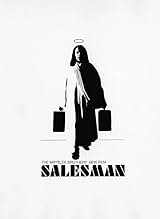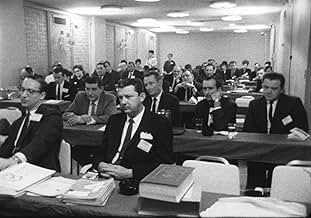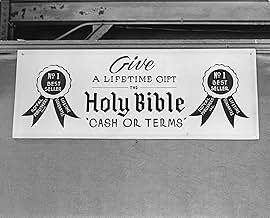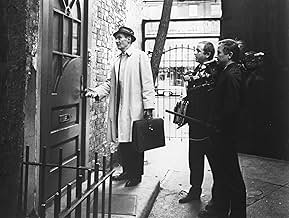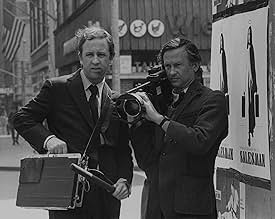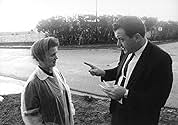IMDb रेटिंग
7.6/10
6 हज़ार
आपकी रेटिंग
अपनी भाषा में प्लॉट जोड़ेंFour dogged door-to-door Bible salesmen travel from Boston to Florida on a seemingly futile quest to sell luxury editions of the Good Book to working-class Catholics.Four dogged door-to-door Bible salesmen travel from Boston to Florida on a seemingly futile quest to sell luxury editions of the Good Book to working-class Catholics.Four dogged door-to-door Bible salesmen travel from Boston to Florida on a seemingly futile quest to sell luxury editions of the Good Book to working-class Catholics.
- पुरस्कार
- कुल 4 जीत
फ़ीचर्ड समीक्षाएं
The camera follows four Bible salesmen as they follow up on names of Catholic parishioners in Boston and then Florida.
I can understand that the documentary is not for all tastes. There's really no narrative, while we know next to nothing about the four principals. Yet, the results, to me at least, are fascinating, if not entertaining. The four Bible salesmen are a harried crew, near the bottom of a commercial food chain. Pressure to sell goes from ownership to management to salesmen, and finally to prospective customers to buy. And throughout, the camera never wavers, at times lingering over a face in rather enigmatic fashion. Nor do the subjects ever acknowledge camera's presence-- quite a cinematic accomplishment. Importantly, these are ordinary faces, certainly not the Hollywood variety.
To me, the most interesting part are the working class customers. They can barely pay the bills they already have, let alone fork over an extra dollar a week. I'm guessing Badger's burnout comes from years of hustling people who should not be hustled. Of course, the pitch revolves around having a Bible with illustrations that will confirm a Catholic's faith and enrich their lives. I'm supposing the salesmen have to believe that at some level, otherwise how could they continue to pressure poor people to buy. And catch the ride by the ritzy Miami Beach hotels, right before the guys start knocking on wear-worn doors.
Overall, this is quite a remarkable 85-minutes, like nothing else I've seen. I'm not sure what to make of the result, that is, whether there's an intended point beyond the momentary. But either way, the unvarnished glimpses the film provides are definitely memorable.
I can understand that the documentary is not for all tastes. There's really no narrative, while we know next to nothing about the four principals. Yet, the results, to me at least, are fascinating, if not entertaining. The four Bible salesmen are a harried crew, near the bottom of a commercial food chain. Pressure to sell goes from ownership to management to salesmen, and finally to prospective customers to buy. And throughout, the camera never wavers, at times lingering over a face in rather enigmatic fashion. Nor do the subjects ever acknowledge camera's presence-- quite a cinematic accomplishment. Importantly, these are ordinary faces, certainly not the Hollywood variety.
To me, the most interesting part are the working class customers. They can barely pay the bills they already have, let alone fork over an extra dollar a week. I'm guessing Badger's burnout comes from years of hustling people who should not be hustled. Of course, the pitch revolves around having a Bible with illustrations that will confirm a Catholic's faith and enrich their lives. I'm supposing the salesmen have to believe that at some level, otherwise how could they continue to pressure poor people to buy. And catch the ride by the ritzy Miami Beach hotels, right before the guys start knocking on wear-worn doors.
Overall, this is quite a remarkable 85-minutes, like nothing else I've seen. I'm not sure what to make of the result, that is, whether there's an intended point beyond the momentary. But either way, the unvarnished glimpses the film provides are definitely memorable.
"Salesman" documents the activities of Bible salesmen as they go on the road to sell their wares to "leads" garnered from Catholic churches. It's a tough life, especially when many prospects cannot afford the cost of these illustrated Bibles.
It is difficult not to compare this film to Mamet's "Glengarry Glen Ross". It details the hardships and humiliations of men who earn their egos through sales. Anyone who has ever sold a product door to door can relate to this film.
The transparent sales techniques. The smug sales aphorisms. The roller-coaster ride from day to day. It is all there.
It is easy to draw conclusions or morals from this documentary. The most obvious refers to the soul-sucking depression that comes from spending your life doing something you do not enjoy or believe in.
As a time capsule of life in the late 60s, the film is enjoyable. Seeing everyone smoking cigarettes nonstop, for example, is a reminder of how things have changed.
It is difficult not to compare this film to Mamet's "Glengarry Glen Ross". It details the hardships and humiliations of men who earn their egos through sales. Anyone who has ever sold a product door to door can relate to this film.
The transparent sales techniques. The smug sales aphorisms. The roller-coaster ride from day to day. It is all there.
It is easy to draw conclusions or morals from this documentary. The most obvious refers to the soul-sucking depression that comes from spending your life doing something you do not enjoy or believe in.
As a time capsule of life in the late 60s, the film is enjoyable. Seeing everyone smoking cigarettes nonstop, for example, is a reminder of how things have changed.
As with Frederick Wiseman's "Titicut Follies," the Maysles brothers' "Salesman" is truly a landmark for the "cinema verite" documentary movement of the 1960s. Although the former is shockingly realistic in a sensational way, "Salesman" is actually the more disturbing for showing the Hell-on-earth that marks the workaday world for most of humanity. If ever a film shows that most people "lead lives of quiet desperation," this is it. In my lifetime of viewing films, I've never seen a non-fiction film more affecting and poignant. That this film didn't make the AFI Top 100 is practically scandalous. Be forewarned, this is an oppressively sad, yet slyly funny, film that is not easy to watch. It speaks volumes about American business practices, the ties between business and organized religion, the exploitation of religious belief (and its perversion via materialism), the dehumanization of workers, the crushing wisdom that can come with aging, the scary mindset of suburban denizens, and a lot more. If ever anyone had the right to ask the question, "Is that all there is?" it would be Paul, an aging Bible salesman having trouble meeting his sales quota, who serves as the film's central character. The film is brutally honest, yet powerfully manipulative. It does beg the question: how much is real and how much is affected by the presence of the cameras? One does feel, after seeing this, that reality is just as bad as Dorothy Parker said it was. For those who fail, the American Dream is a nightmare. In short, a film you'll never forget.
From the Maysles Brothers (Gimme Shelter, Monterey Pop, When We Were Kings) comes this unsettling portrait of door-to-door salesmen. In this case, the film is especially interesting since they're selling Bibles to Catholic families. All the sales tricks are there, with a special dose of guilt. Most interesting is the portrayal of Paul, one of the older salesmen, who is realizing he may have "lost it." His desperation is painful to watch. (9/ 10)
This film is about the trials and tribulations of four door-to-door Bible salesmen in 1968, on the eve of when their occupation was about to become extinct. Of course, the filmmakers could not know that at the time, but this fact is what adds to the sadness of this film today. The salesmen are four New Englanders named Paul "The Badger" Brennan, James "The Rabbit" Baker, "The Bull" and "The Gipper", their nicknames being derived from their individual sales tactics. Despite the holiness of their products, this really is a cutthroat business, as is made evident in some of the sales meetings that are shown. The main character, "The Badger", reminds me of Jack Lemmon's character in Glengarry Glen Ross. Life - and his profession - have beaten him down, and none of his sales pitches are working as he talks to one indifferent potential customer after another. These guys are always looking for a new angle to make the sale, but usually just about everything they come up with is not successful. Remember, this was in the days when people were unafraid to open their doors to strangers, and equally unafraid to be rude to them. The film not only makes you feel what these unsuccessful salesmen are feeling, it a time capsule for the end of the '60s, and a portrait of an occupation that doesn't really exist anymore due to telemarketing, Internet sales, two-income families meaning nobody is home during the day, and finally the fact that adult strangers on your doorstep are assumed to be potential criminals.
Paul Brennan really seems to have the saddest story of the four. His sales are dwindling, and he is really too old to start over in another occupation. Paul's sales become so poor that at one point that he is partnered with a more aggressive salesman so Paul can observe his technique in the hope that something will rub off on Paul. This younger, sharper salesman, who obviously has not yet developed a tolerance for human frailty, is constantly snapping at Paul for his poor technique and unenthusiastic delivery. If you're an older person who has ever worked for a younger one, you know what I'm talking about. As sorry as you may feel for him though, when we see Paul using the possibly superstitious beliefs of his customers to get them to buy products they may not be able to afford, you have mixed feelings about the man. Is Paul purely being manipulative, or is he resorting to desperate means to survive? Probably a little bit of both is true. Paul realizes that his time as a salesman is coming to a close, and it's not like he has a big bank account to fall back on. Such career struggles are expected when you are in your 20's, but by the time you are Paul's age you are expecting something more...more job stability, more respect, more financial security.
The film does add some humor throughout the film to keep the viewing experience from being too much like a funeral for both Paul's career and the profession of door-to-door salesman itself. Sometimes the salesmen lighten up and even have some camaraderie in their conversations. Sometimes there is a funny remark from the "no sale" Boston housewives the salesmen encounter, and sometimes there are even funnier remarks from the salesmen as they leave a house where they've been refused. There's also an episode in a hotel pool in the middle of the night that is rather humorous.
I'd say that even though the film has a very dated look to it, you should watch it because what it has to say about the human spirit, aging ungracefully, choosing the wrong career, and then failing at that career is timeless.
Paul Brennan really seems to have the saddest story of the four. His sales are dwindling, and he is really too old to start over in another occupation. Paul's sales become so poor that at one point that he is partnered with a more aggressive salesman so Paul can observe his technique in the hope that something will rub off on Paul. This younger, sharper salesman, who obviously has not yet developed a tolerance for human frailty, is constantly snapping at Paul for his poor technique and unenthusiastic delivery. If you're an older person who has ever worked for a younger one, you know what I'm talking about. As sorry as you may feel for him though, when we see Paul using the possibly superstitious beliefs of his customers to get them to buy products they may not be able to afford, you have mixed feelings about the man. Is Paul purely being manipulative, or is he resorting to desperate means to survive? Probably a little bit of both is true. Paul realizes that his time as a salesman is coming to a close, and it's not like he has a big bank account to fall back on. Such career struggles are expected when you are in your 20's, but by the time you are Paul's age you are expecting something more...more job stability, more respect, more financial security.
The film does add some humor throughout the film to keep the viewing experience from being too much like a funeral for both Paul's career and the profession of door-to-door salesman itself. Sometimes the salesmen lighten up and even have some camaraderie in their conversations. Sometimes there is a funny remark from the "no sale" Boston housewives the salesmen encounter, and sometimes there are even funnier remarks from the salesmen as they leave a house where they've been refused. There's also an episode in a hotel pool in the middle of the night that is rather humorous.
I'd say that even though the film has a very dated look to it, you should watch it because what it has to say about the human spirit, aging ungracefully, choosing the wrong career, and then failing at that career is timeless.
क्या आपको पता है
- ट्रिविया49.95 U.S. Dollars (which is what the Bibles sold by the salesmen cost in 1965-66, the time of the movie) is the equivalent of about $500 in 2025.
- कनेक्शनFeatured in Camera Three: Direct Cinema: Part 1 (1969)
टॉप पसंद
रेटिंग देने के लिए साइन-इन करें और वैयक्तिकृत सुझावों के लिए वॉचलिस्ट करें
- How long is Salesman?Alexa द्वारा संचालित
विवरण
- रिलीज़ की तारीख़
- कंट्री ऑफ़ ओरिजिन
- आधिकारिक साइटें
- भाषा
- इस रूप में भी जाना जाता है
- The Maysles Brothers' Salesman
- फ़िल्माने की जगहें
- Auburn, मैसाचुसेट्स, संयुक्त राज्य अमेरिका(The Yankee Drummer Inn)
- उत्पादन कंपनी
- IMDbPro पर और कंपनी क्रेडिट देखें
बॉक्स ऑफ़िस
- बजट
- $1,05,000(अनुमानित)
- चलने की अवधि1 घंटा 31 मिनट
- रंग
- ध्वनि मिश्रण
- पक्ष अनुपात
- 1.37 : 1
इस पेज में योगदान दें
किसी बदलाव का सुझाव दें या अनुपलब्ध कॉन्टेंट जोड़ें


